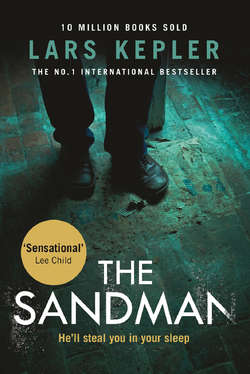Читать книгу The Sandman - Ларс Кеплер - Страница 43
37
ОглавлениеFrom a distance the white blocks of Södermalm Hospital look like gravestones looming out of the thick snow.
Moving like a sleepwalker, Reidar Frost buttoned his shirt on the way to Stockholm and tucked it into his trousers. He’s heard the police say that the patient who has been identified as Mikael Kohler-Frost has been moved from intensive care to a private room, but it all feels as if it’s happening in a parallel reality.
In Sweden, when there are grounds to believe someone is dead, the relatives can apply for a death certificate after one year even though there is no body. Reidar had waited six years for his children’s bodies to be found before he applied for death certificates. The Tax Office authorised his request, the decision was taken, and the declarations became legally binding six months later.
Now Reidar is walking beside the plain-clothed officer down a long corridor. He doesn’t remember which ward they’re on their way towards, he just follows her, staring at the floor and interwoven tracks left by the wheels of countless beds.
Reidar tries to tell himself not to hope too much, that the police might have made a mistake.
Thirteen years ago his children disappeared, Felicia and Mikael, when they were out playing late one evening.
Divers searched the waters, and the whole of the Lilla Värtan inlet was dragged, from Lindskär to Björndalen. Search parties had been organised and a helicopter spent several days searching the area.
Reidar provided photographs, fingerprints, dental records and DNA samples of both children to assist in the search.
Known offenders were questioned, but the conclusion of the police investigation was that one of the siblings had fallen into the cold March water, and the other had been dragged in while trying to help the first one out.
Reidar secretly commissioned a private detective agency to investigate other possible leads, primarily everyone in the children’s vicinity: all their teachers, football coaches, neighbours, postmen, bus drivers, gardeners, shop assistants, café staff, and anyone the children had come into contact with by phone or on the internet. Their classmates’ parents were checked, and even Reidar’s own relatives.
Long after the police had stopped looking, and when everyone with even the faintest connection to the children had been investigated, Reidar began to realise that it was over. But for several years after that he carried on walking along the shore every day, expecting his children to be washed ashore.
Reidar and the plain-clothes officer with the blonde ponytail down her back wait while a bed containing an old woman is wheeled into the lift. They head over to the doors to the ward and pull on pale blue shoe-covers.
Reidar staggers and leans against the wall. He has wondered several times if he’s dreaming, and daren’t let his thoughts get carried away.
They carry on into the ward, passing nurses in white uniforms. Reidar feels composed, he’s clenched tight inside, but he can’t help walking faster.
Somewhere he can hear the noise of other people, but inside him there is nothing but an immense silence.
At the far end of the corridor, on the right, is room number four. He bumps into a food trolley, sending a pile of cups to the floor.
It’s as if he’s become detached from reality as he enters the room and sees the young man lying in bed. He has a drip attached to the crook of his arm, and oxygen is being fed into his nose. An infusion bag is hanging from the drip-stand, next to a white pulse-monitor attached to his left index finger.
Reidar stops and wipes his mouth with his hand, and feels himself lose control of his face. Reality returns like a deafening torrent of emotions.
‘Mikael,’ Reidar says gently.
The young man slowly opens his eyes and Reidar can see how much he resembles his mother. He carefully puts his hand against Mikael’s cheek, and his own mouth is trembling so much that he can hardly speak.
‘Where have you been?’ Reidar asks, and realises that he’s crying.
‘Dad,’ Mikael whispers.
His face is frighteningly pale and his eyes incredibly tired. Thirteen years have passed, and the child’s face that Reidar has hidden in his memory has become a man’s face, but he’s so skinny that he looks like he did when he was newborn, wrapped in a blanket.
‘Now I can be happy again,’ Reidar whispers, stroking his son’s head.
